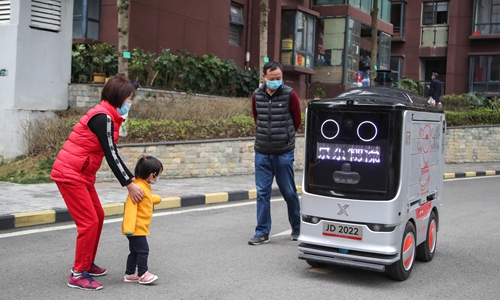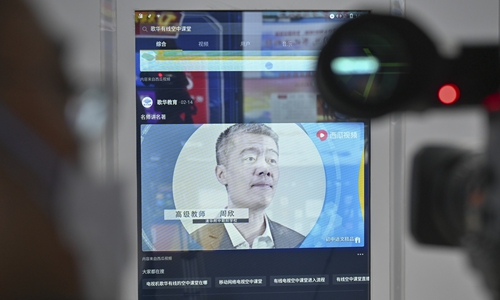HOME >> SOURCE
New household consumption emerges amid epidemic
By Song Lin Source:Global Times Published: 2020/3/1 19:42:48
COVID-19 brings in crises as well as opportunities: experts

A JD Logistics' automatic delivery robot delivers goods in a community in Guiyang, Southwest China's Guizhou Province on February 26. Photos: cnsphotos
From household fitness to baking, and from cloud education to online working systems, the outbreak of the novel coronavirus pneumonia has been triggering households across China to develop new consumption patterns while combating the virus with suspended production and social activities.
"I just tried to kill some time at the beginning, then I ended up buying a lot of bakeware and plenty of materials," Nancy Zhang from Shenzhen, South China's Guangdong Province, told the Global Times on Saturday.
"Ever since I came back from the UK two years ago, I have not cooked anything except instant noodles," Nancy said, and staying at home for the last month helps her cultivate a new hobby - baking.
Sales of yeast-related products, which are used to bake cakes, bread and buns, skyrocketed more than 40 times during the Spring Festival period, according to data from China's leading takeaway delivery platform meituan.com.
Since the outbreak of the COVID-19 from late January, China has taken all-out efforts to try to contain the spread of the virus as quickly as possible, which in turn led the country to a nearly standstill for the past month. Numerous factories and outlets halted operation, including hair and nail salons.
Zhu Min, a former deputy managing director of the IMF, said at a forum that shrinking aggregate demand could drag China's consumption down to negative growth in the first quarter due to the COVID-19, and a total of 1.38 trillion yuan ($200 billion) in consumption is expected to be lost in January and February due to the epidemic.
Though the virus paralyzed a lot of sectors, some businesses, by contrary, have embraced a stimulus amid the epidemic.
A Beijing-based resident surnamed Li told the Global Times that her online shopping hasn't been impacted much, however her shopping list is quite different than before. Besides normal snacks and daily supplies, she also bought a haircut kit, which includes an electric shaver and a pair of special scissors.
"I've been giving haircuts to my husband and my son, which turned out to be very successful," she said.
She even dyed her hair pink. "I've always wanted to try the color," she said. Since she is not going to meet any of her clients in person any time soon, she finally gave it a try.
Li joked that she is quite talented at the new skill and could start a hair salon when the epidemic is over.
She also bought boxes of fruits and agricultural products since all family members are now eating at home, and the move could help farmers whose products have had low sales amid the epidemic.
According to data from JD Big Data Research Institute, an affiliate of China's e-commerce giant JD.com, household fitness-related consumption during the Spring Festival holidays was 2.43 times higher than the previous year, and video game-related consumption was 2.54 times higher.
Opportunities emerge
Dingtalk, an enterprise communication and collaboration platform developed by China's tech giant Alibaba, rolled out a daily health report system in 40 hours and offered it to all its users free of charge.
With a series of services tailored for the epidemic period that keep rolling out, Dingtalk assists more than 10 million firms and institutions and 200 million people to maintain a normal online collaboration, said Chen Hang, CEO of the company, during a live-streaming press conference on Tuesday.
The platform also offers free service to schools and students. It assists schools from 300 cities to resume classes after the Spring Festival, which covers more than 50 million students.

Beijing Gehua CATV Network Co showcases its online classes program at its headquaters on February 27.
Some online education-related shares have seen continuous surging despite concerns over the economic impact brought about by the virus.
"Cloud services have developed for years in China against the backdrop of the rapid developing internet sector, and the outbreak of the COVID-19 has generated a stimulus effect for these industries," Liu Dingding, a senior industry expert, told the Global Times on Saturday.
"For former growth of these online service providers, which may need three to five years, now may only take several months," Liu said.
Industries with rigid demand, such as online education, will still see a fast growth even after the epidemic, Liu forecasted.
Delivery platforms have also seen rapid growth during the period as people are going out less and trying to reduce direct contact.
FreshHema, an online grocery store that specializes in the delivery of fresh produce, even "rented" some employees from Yunhaiyao and Youth restaurants in Beijing, as restaurants have taken a serious hit from the virus. FreshHema announced on February 12 that it will hire about 30,000 new staff within the year, according to a statement on its official account on China's Twitter-like social media platform Weibo.
Efficiency experiment
Given the current situation, industries are encouraged to discover potential demand, and come up with new approaches to serve customers safely and effectively, according to Zhao Jingqiao, director of the Service Economy and Catering Industry Research Center under the Chinese Academy of Social Sciences.
When speaking of the cloud service, which has offered a great amount of help for enterprises across the country to resume operation, Zhao said it is also an opportunity for firms and institutions to make adjustments to their daily administration.
Firms are forced to take on an "experiment" to form a remote working and managing system, which may be fully or partly maintained by companies after the epidemic if it is more efficient, Zhao said.
With firms and institutions undergoing a process to adjust their operation systems, the overall efficiency of the whole society and economic growth after the epidemic would be optimized, Zhao noted.
Although the newly growing consumption style by households and the cloud service providers have ensured basic operations of a lot of firms and stimulated growth of certain sectors, it would be more critical for various industries in society to resume comprehensive production on the premise of sound epidemic prevention as soon as possible, experts stressed.
Different industries have been developing in a more integrated manner, and no single industry could develop in the long term with other sectors being stranded by the epidemic, Liu said.
Only when the whole industrial system has resumed to normal operation, the economic growth can return to a positive cycle, experts said.
Newspaper headline: New household consumption emerges
Posted in: INDUSTRIES,BIZ FOCUS